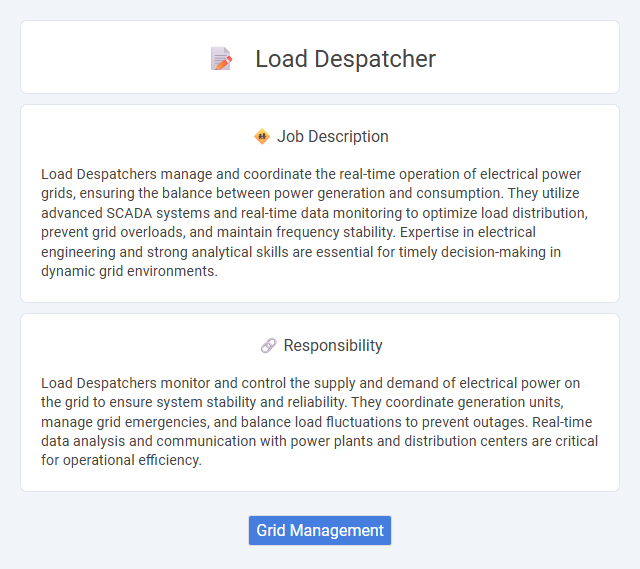
Load Despatchers manage and coordinate the real-time operation of electrical power grids, ensuring the balance between power generation and consumption. They utilize advanced SCADA systems and real-time data monitoring to optimize load distribution, prevent grid overloads, and maintain frequency stability. Expertise in electrical engineering and strong analytical skills are essential for timely decision-making in dynamic grid environments.
Individuals with strong analytical skills and the ability to remain calm under pressure are likely to be well-suited for a Load Despatcher role. Those who can quickly interpret complex data and communicate effectively may find this job aligns with their capabilities. People who struggle with multitasking or decision-making in dynamic environments may face challenges in this position.
Qualification
A Load Despatcher typically requires a bachelor's degree in electrical engineering or a related technical field, along with specialized training in power system operations and grid management. Proficiency in SCADA systems, energy management systems (EMS), and real-time load monitoring is essential for efficient grid control and power distribution. Certifications such as NPTI accreditation or relevant state regulatory body approvals enhance eligibility and practical expertise in this role.
Responsibility
Load Despatchers monitor and control the supply and demand of electrical power on the grid to ensure system stability and reliability. They coordinate generation units, manage grid emergencies, and balance load fluctuations to prevent outages. Real-time data analysis and communication with power plants and distribution centers are critical for operational efficiency.
Benefit
A Load Despatcher's role probably offers significant benefits such as developing expertise in energy management and grid operations, which are crucial in power system reliability. The position may provide stable employment with a competitive salary due to the essential nature of maintaining load balance and system security. Exposure to advanced control technologies and real-time problem-solving scenarios could enhance career growth and professional skill sets.
Challenge
The role of a Load Despatcher likely involves managing complex power grids, requiring keen attention to real-time data and critical decision-making under pressure. Challenges may arise from the need to balance electricity supply and demand accurately while responding swiftly to unexpected system faults or emergencies. This job probably demands strong analytical skills and resilience to maintain grid stability and prevent outages.
Career Advancement
A career as a Load Despatcher offers significant growth opportunities in the energy and utilities sector, advancing from operational roles to managerial positions such as System Operator or Grid Manager. Expertise in real-time power grid management, demand forecasting, and load balancing enhances prospects for leadership roles in regional and national electricity distribution companies. Continuous skill development in smart grid technologies and regulatory compliance further accelerates career progression within this critical infrastructure domain.
Key Terms
Grid Management
Load Despatchers play a critical role in grid management by monitoring and controlling the real-time operation of power systems to ensure a balance between electricity supply and demand. They utilize advanced SCADA and EMS systems to manage grid frequency, voltage levels, and the integration of renewable energy sources, preventing grid instability and outages. Their responsibilities include coordinating with generating stations and transmission operators to optimize power flow and maintain system reliability in compliance with regulatory standards.
 kuljobs.com
kuljobs.com